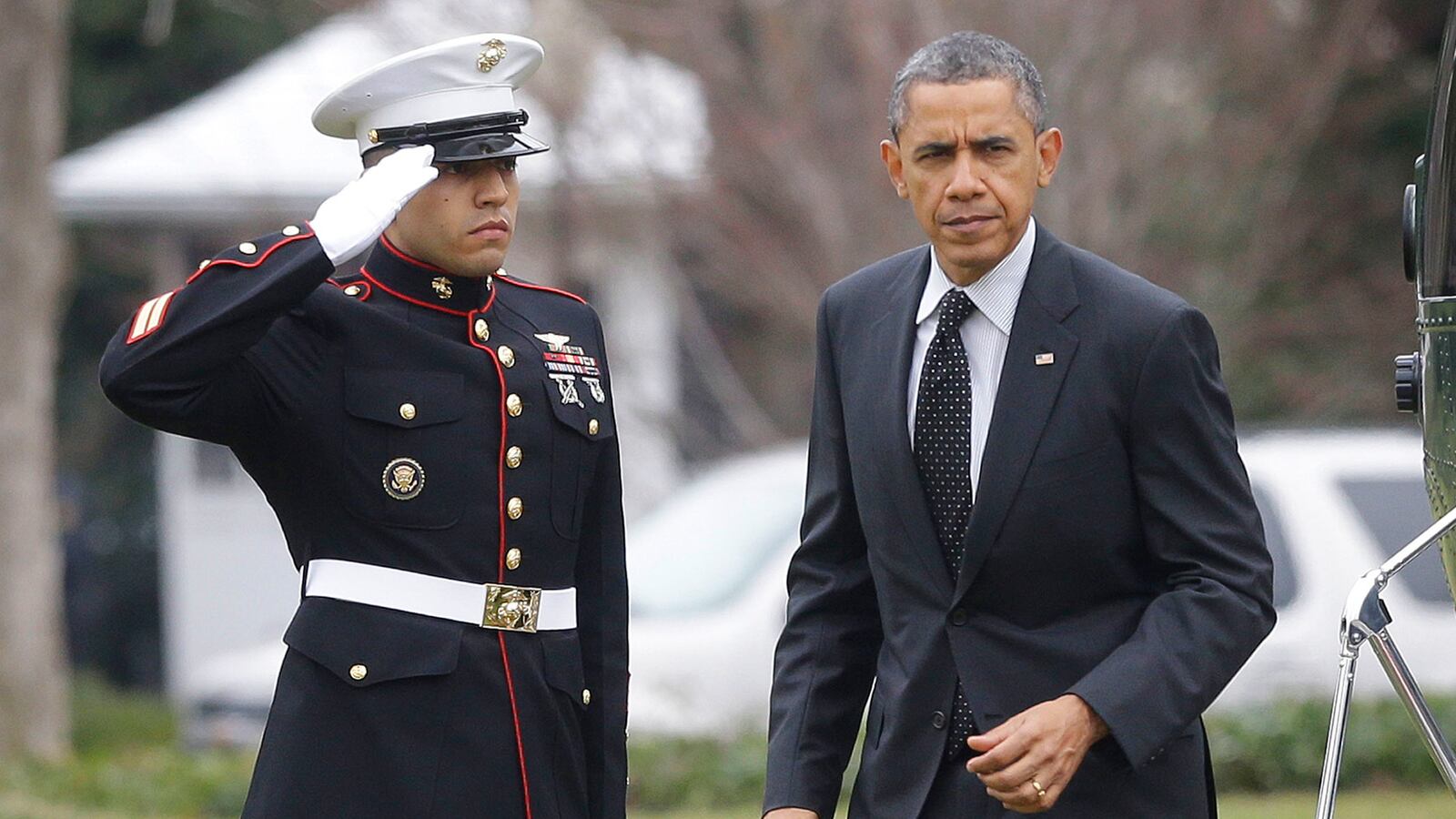
President Obama heads into Tuesday’s State of the Union speech with a crippling sequester looming, and the tone he takes toward his adversaries could determine whether automatic cuts in spending will follow less than three weeks later. Will he follow the fighting tone of his second inaugural? How combative will he get in urging Congress to come up with a plan to avert the sequester, and how directly will he blame the Republicans for the current impasse?
The SOTU is a night for highlighting partisan differences, as lawmakers take turns standing and clapping or sitting and scowling based on the policies that separate them. With the advent of the Tea Party and record deficits, the two parties have rarely been more bitterly divided than they are under Obama. Even so, former Clinton budget chief Alice Rivlin says Obama should return to the tone of his ’08 campaign, when he said, naively, she concedes, that he came to Washington to change the tone. “It hasn’t worked very well, but this is the moment to go back to it, because if he doesn’t, he dooms the rest of his term to squabbling with the Republicans.”
Finding some accommodation with Republicans is imperative in the short term. If the sequester goes into effect, the recovery would be derailed, a million jobs lost in the defense industry, children tossed off the Head Start rolls, medical research into cancer and Alzheimer’s imperiled, a litany of ills that Obama will cite Tuesday evening. Republicans won’t respond well if he demonizes them as heartless and uncaring about anybody but the rich, and they’ll be listening to see if he talks seriously about slowing the growth of entitlements, Medicare and Medicaid, and putting Social Security on a sounder footing.
Speaking with a small group of reporters at the Brookings Institution on Friday, Rivlin said, “If the Democrats with presidential leadership are willing to do what Republicans say they’ve wanted for a long time ... then Republicans might buy into additional revenue” by adopting the plan Mitt Romney advanced during the campaign of capping deductions for wealthier taxpayers. “I think there’s a deal there.”
Offering a counterpoint to Rivlin’s measured optimism was Brookings senior fellow Ron Haskins, a veteran of both the Bush White House and congressional staff work on the Republican side. “Don’t hold your breath,” he warned anyone expecting Obama to seriously tackle entitlement reform. “He has every reason to sit tight and play to his base. The American public is very much on his side,” said Haskins, who cited polls that show voters by a ratio of 2 to 1 see Obama as the one who’s trying to solve problems.
“Republicans are going to be nicer,” says Haskins. There will be no one shouting “He lies” at the president like in 2010, but the Republican shift in tone and rhetoric that is under way is unlikely to produce a changed position on finding additional revenue. “They gave already at the office,” says Haskins, referring to the rise in the top rate that was part of the New Year’s deal to avert the fiscal cliff. “They’ll not do it again.”
Gun safety and immigration reform will get top billing Tuesday night, and with almost universal public support for background checks, Obama will get something from Congress he can call a victory. Republicans are also moving on immigration, which leaves sequester as the eyesore of the evening.
The SOTU is the biggest captive audience Obama will have before the ax is due to fall March 1. It’s his chance to educate and influence the American people and potentially move the Congress. A senior White House official says the president will use the speech “to reinforce his commitment to expanding economic opportunity for middle-class families and those Americans striving to get there. It will be focused on the pocketbook issues that dominated the debate in his first term and proved decisive in the outcome of last year’s election.”
The White House is urging reporters to view the inaugural address and SOTU as “two acts in the same play,” so that in addition to the middle-class economic focus Tuesday, “the president will echo many of the themes in the inaugural address.” It is sure to be an emotional evening, with survivors of gun violence and young people striving for citizenship known as “DREAMers” seated in the House chamber to symbolize policy changes under way.
Obama prides himself on playing the long game, and if he wants to preserve his ability to govern, he has to clear away the successive choke points that lie ahead, beginning with sequestration on March 1, then a potential government shutdown March 27, and then another debt-ceiling deadline May 19. Invoking Democrat Mario Cuomo’s famous remark, “You campaign in poetry; you govern in prose,” Brookings political theorist William Galston called Obama’s second inaugural “the ensemble of beliefs that returned him to power,” the last speech of the 2012 campaign–while Tuesday’s SOTU will be the first speech of his second term.
“He will be condemned to an unimportant small-ball second term if he doesn’t take this on,” Galston says of the fiscal challenges ahead. There won’t be much poetry if Obama isn’t able to master the prosaic work of governing.






